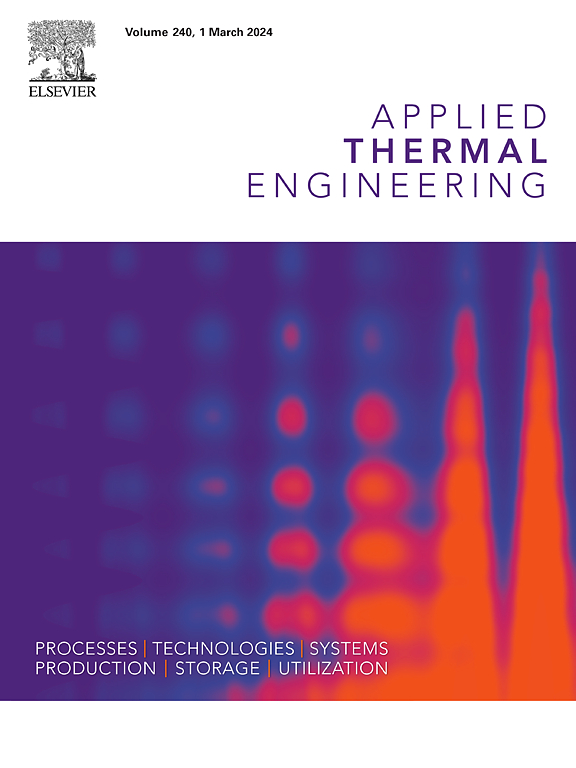发电用富氢燃料的热和环境影响性能实验评价
IF 6.9
2区 工程技术
Q2 ENERGY & FUELS
引用次数: 0
摘要
向低碳能源的未来过渡需要多方面的方法,包括提高现有的发电技术。本研究提供了一个全面的实验评估富氢作为一种策略,以提高性能和减少排放的发电机。一台3.65千瓦的发电机配备了火花点火发动机,系统地测试了五种不同的基础燃料:汽油、丙烷、甲烷、乙醇和甲醇。使用定制的双燃料化油器,每种燃料与纯氢按5%、10%、15%和20%的比例进行体积混合。关键参数,包括废气排放(CO2, CO, HC, NOx),气缸出口温度,电力输出和热力学效率(能量和火用),都经过精心测量和分析。结果表明,氢浓缩是脱碳的有力工具,可以持续减少所有燃料的碳基排放。在20%的氢混合物中,二氧化碳排放量减少了22 - 31%,CO排放量减少了39 - 60%,HC排放量减少了21 - 60%。然而,这种环境效益伴随着一个关键的权衡:由于燃烧温度显著升高,氮氧化物排放量严重增加,增加了200 - 420%。氢气的加入使得低能量密度燃料(如甲烷和丙烷)的性能与汽油相当,从而使动力输出增加了2 - 16%。热力学分析证实了这些收益,能源效率显示出明显的改善,特别是甲烷,从42.0%增加到49.9%。虽然氢浓缩为提高发动机性能和减少发电机碳排放提供了可行的途径,但氮氧化物的大幅增加需要集成先进的控制和后处理系统,以实现实用和环保的部署。本文章由计算机程序翻译,如有差异,请以英文原文为准。
Experimental thermal and environmental impact performance evaluations of hydrogen-enriched fuels for power generation
The transition to a low-carbon energy future requires a multi-faceted approach, including the enhancement of existing power generation technologies. This study provides a comprehensive experimental evaluation of hydrogen enrichment as a strategy to improve the performance and reduce the emissions of a power generator. A 3.65 kW power generator that is equipped with spark-ignition engine is systematically tested with five distinct base fuels: gasoline, propane, methane, ethanol, and methanol. Each fuel is volumetrically blended with pure hydrogen in ratios of 5 %, 10 %, 15 %, and 20 % using a custom-developed dual-fuel carburetor. The key parameters, including exhaust emissions (CO2, CO, HC, NOx), cylinder exit temperature, electrical power output, and thermodynamic efficiencies (energy and exergy), are meticulously measured and analyzed. The results reveal that hydrogen enrichment is a powerful tool for decarbonization, consistently reducing carbon-based emissions across all fuels. At a 20 % hydrogen blend, CO2 emissions are reduced by 22–31 %, CO emissions by 39–60 %, and HC emissions by 21–60 %. This environmental benefit, however, is accompanied by a critical trade-off: a severe increase in NOx emissions, which rose by 200–420 % due to significantly elevated combustion temperatures. The power outputs are increased by 2–16 %, with hydrogen addition enabling lower-energy–density fuels like methane and propane to achieve performance parity with gasoline. Thermodynamic analysis confirms these gains, with energy efficiency showing marked improvement, particularly for methane, which has increased from 42.0 % to 49.9 %. While hydrogen enrichment presents a viable pathway for enhancing engine performance and reducing the carbon emissions of power generators, the profound increase in NOx necessitates the integration of advanced control and after-treatment systems for its practical and environmentally responsible deployment.
求助全文
通过发布文献求助,成功后即可免费获取论文全文。
去求助
来源期刊

Applied Thermal Engineering
工程技术-工程:机械
CiteScore
11.30
自引率
15.60%
发文量
1474
审稿时长
57 days
期刊介绍:
Applied Thermal Engineering disseminates novel research related to the design, development and demonstration of components, devices, equipment, technologies and systems involving thermal processes for the production, storage, utilization and conservation of energy, with a focus on engineering application.
The journal publishes high-quality and high-impact Original Research Articles, Review Articles, Short Communications and Letters to the Editor on cutting-edge innovations in research, and recent advances or issues of interest to the thermal engineering community.
 求助内容:
求助内容: 应助结果提醒方式:
应助结果提醒方式:


